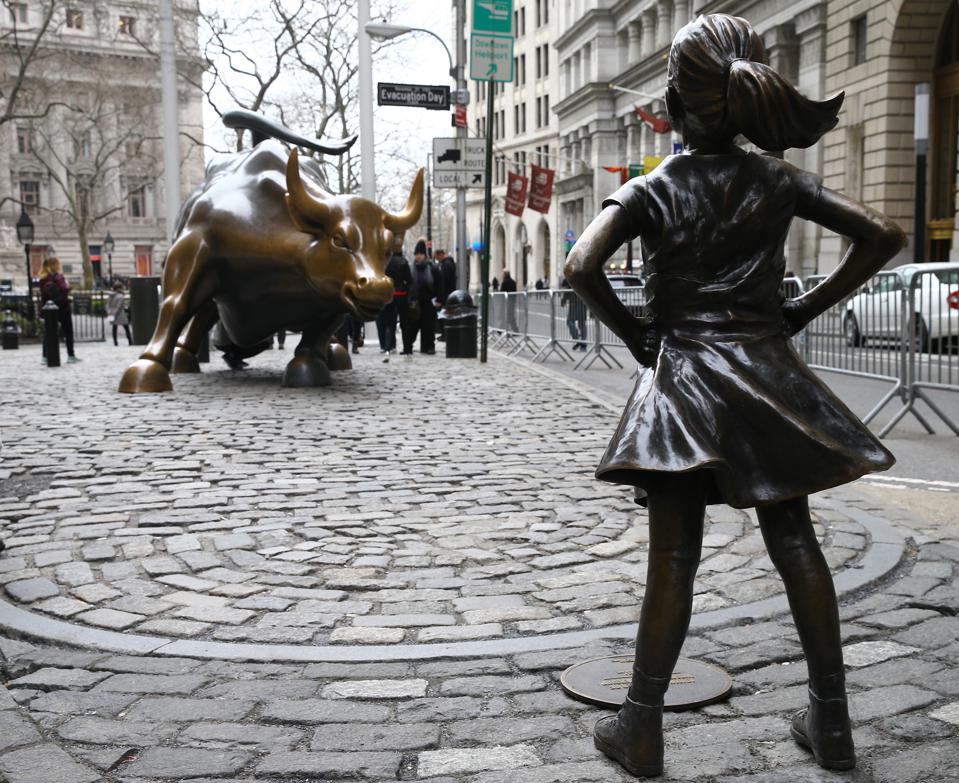
Survival Of The Kindest: A New Mantra To Rebuild The Global Economy
That our current global economic system is broken is no surprise. The question is where to turn to for hope. New insights from nature may provide the answer.
A broken economic system
Underlying economic injustices have been magnified by the coronavirus pandemic. Historically underrepresented groups have all fared worse off over the past 12 months since the outbreak of the virus. A younger generation now faces a historic amount of debt, similar to having faced a World War, in addition to the challenges of irreversible climate change and global biodiversity collapse.

A closer examination of this growing inequality reveals just how fragile current economic structures have become, with social unrest bubbling just under the surface in many countries around the world. As hundreds of millions continue to face prolonged lockdowns, higher health risks, lost schooling, mass unemployment and economic ruin, ten billionaires alone saw their wealth increase by $450 billion during the pandemic. The wealthiest 2000 billionaires in the world saw their assets hit new highs, increasing to over $10 trillion in value. An economic system with such disparities, that rewards those with access to capital, is not sustainable.
Political leaders around the world performed poorly in responding to the coronavirus crisis (Bill Gates questioned whether any country merited an ‘A’ grade for their response).

These very same political leaders (many of whom are increasingly authoritarian) are now using taxpayer funds or future borrowing to roll out multi-trillion dollar pandemic stimulus packages around the world. Rather than coordinating such a financial injection to ensure a global economy is rebuilt in a way that is more just, equitable, innovative and harmonious with nature, the world is seeing a fragmented patchwork of short term, reactive measures that do not address the structural faults in the global economy, or appear to be coordinated in any way to address global systemic risks.
The multi-trillion dollar opportunity is being squandered, and history shows that this will be an expensive mistake.
Lessons of hope from history
There are small windows in history when human value systems shift so fundamentally in a short period of time that the entire economic system is forever altered after such crises. In several instances, these shifts in human values have improved the state of the world. For example:

- By the 1850s following a series of revolutions in Europe and the U.S., human values turned against slavery after centuries of this system being the dominant economic driver for European nations and their colonies.

- A century later by the end of the Second World War in 1945 and following the horrors of the Holocaust, the Universal Declaration of Human Rights introduced to the United Nations by Eleanor Roosevelt exemplified and codified a set of fundamental rights that all humans on the planet were entitled to under the newly formed United Nations.

- In the 1960s the Civil Rights, Women Rights and Independence Movements around the world saw a shift of values to mark the end of colonialism, greater rights for women and greater racial equality around the world. Economic systems changed to reflect this reality, with a ream of legislation and business practices designed for greater equality in the workplace.

- By the early 21st century the battle to win hearts and minds for the environment is still very much being waged as the world faces all time high deforestation rates, a global collapse in biodiversity, irreversible climate change, industrial overfishing and melting icecaps. Although there have been some important victories, there is still strong resistance by well funded extractive and fossil fuel organizations, and an elder generation holding onto senior leadership positions with a different set of values to an increasingly vocal younger generation of workers, investors and consumers.
The last decade has seen a regression of much of the progress of the 20th century as inequality of opportunity has risen around the world. The international responses to the 2008 and 2011 financial crises were wasted, as the then $1 trillion stimulus packages coordinated via the E.U., G20, World Bank and IMF ended up recreating existed cleavages in society, which were already unsustainable, as a decade of austerity eroded critical social safety nets around the world.
With social cohesion breaking down and irreversible climate change soon upon us, the time for timid steps are over.
‘Building Back Better’ means bold choices

Building back better must mean that the means should justify the ends. There cannot be a rush toward more a sustainable economy that create new green monopolies. The growth must be inclusive.
The core to building back a better economic system will require the architects of the post-pandemic economic order to come to terms with a foundational error in science from 150 years ago, that continues to plague the global economy today.
It is to do with a fundamental misunderstanding of the natural world, which led to the birth of modern economic thinking. It is this system of incentives that now define the winners and losers of the global economic system, including its impact on the society and the environment.
Advances today in molecular biology and advanced genetics are revealing new insights into how misguided this science was 150 years ago, and the profound implications for how the economic system can be redesigned.
The birth of Natural Selection

In 1859, a 48-year old Charles Darwin famously completed his iconic book the On the Origin of Species, after travelling the world on a scientific expedition on board The Beagle. Origin of Species became the seminal work that provided a unifying theory for evolution and natural selection for the first time. Indeed, the full title of the book was, “On the Origin of Species by Means of Natural Selection, or the Preservation of Favoured Races in the Struggle for Life.” It became the predominant doctrine of many leading thinkers of the time such as Alfred Wallace and Thomas Malthus.
At the core, was an assumption that there were winners and losers in evolution. This led to the term the ‘Survival of the Fittest’ to explain who the winners of evolution were. This process was termed ‘Natural Selection.’
The notion of a Natural Selection of winners was swiftly taken up by researchers at the time as the lens through which to study nature, wildlife and biology. European biologists were captivated by the notion that brutal forces of nature defined that only the fittest or most selfish would survive. Darwin’s work led to a unifying-theory of a well-structured biological pecking order, explained by a simplified and precise mathematical formula that defined the position of each species, with the most powerful on top. It was very Victorian England.

Nothing exemplified this more than the imagery of the powerful, carnivorous lion chasing its herbivorous prey across the plains of Africa. A process of natural selection would determine which species would be at the top of the food chain, a product of what skills they needed to survive over thousands of years of evolution. Those at the top of these biological pyramids could expect to die of old age, whereas life for other creatures lower down would be brutal, short and defined by constantly being on their guard.
Although a fringe notion at the time in the 1860s, it would take another seventy years for Darwin’s theories of evolution, natural selection and the ‘survival of the fittest’ to become mainstream by the 1930s.
This theory of natural selection explained by the concept of ‘survival of the fittest’ then went on to dominate scientific thinking for the next 100 years through to today.
‘Survival of the Fittest’ becomes an economic doctrine

Darwin’s theories originated in evolutionary biology, but soon infused itself into the leading economic, social and political thinkers of the time.
In the fervent first three decades at the start of the 20th century with a World War, a Spanish Flu pandemic, a Great Depression and New Deal Recovery, economists and political scientists were searching for new unifying economic theories to find an alternative economic models than one of dominant robber baron monopolies built during the modern industrial revolutions of the late 19th and early 20th century.
Darwin’s ideas around ‘survival of the fittest’ soon fit in well with notions of what was seen as a ‘natural order’ for business, economics and the social sciences.

Iterations of this brutal ‘winner rises to the top’ world became core to business and economic thinking over the course of the twentieth century. This mantra defined internal working cultures within companies, competition regulations, and core decision-making at the very top of corporations where the Board of Directors had a disproportionate say over the direction of a company, overriding concerns from employees, the environment, suppliers, and the local community. It was a scarcity mindset where there was only room on top for just a handful of organizations or leaders. Relatively little effort was made to invest in alternative, more collaborative business models or ecosystems.
It was a way of thinking that valued competition above collaboration, selfishness above empathy, aggression above pacifism.

For over a century, it was believed that only the most self-serving businesses or leaders (usually alpha-male) should be allowed to survive. The thinking was that this would create a fitter and more robust economic system as a whole. Even if every decade, the list of most valuable businesses may change as different sectors reached their zenith, there was faith that shareholder capitalism would lead to a better outcome for society. GDP and market capitalization became the new Gods.
However, what it ended up creating was a more brutal version of business. One where quarterly results trumped all decision-making within a company. Business executives would do anything to hit quarterly targets. Other stakeholders (customers, employees, suppliers, the environmental, the local community) were given significantly lower weight, and were usually seen as marketing gimmicks.

Even companies whose humble origins once gave hope that such a system could be upended - companies like Google and Facebook - have now become the poster children for this ‘winner takes all’ business model. Just as banks were ‘too big to fail’ a decade ago, Big Tech’s dominance has created major weaknesses in modern economic and social systems. The pursuit of quarterly profits mean that efforts such as ethical A.I. or ensuring full external oversight of operations, were scaled back.
For national economies to ‘build back better,’ this broken model of shareholder capitalism has to be fundamentally addressed as part of any stimulus package.
It requires re-evaluating what ‘Survival of the Fittest’ means.
The fundamental misunderstanding of science

In recent years, new advancements in molecular biology and DNA technology have fundamentally challenged Darwin’s thinking and inferences on natural selection.
It has allowed biologists to go further and deeper in their understanding of evolution, and question whether natural selection really was due to a ‘survival of the fittest.’ Indeed, it questioned what ‘fittest’ actually meant.
Studying fossils, ancient DNA and using large datasets and machine learning to develop unprecedented insights, scientists have been able to peer back through deep time to see when various species started to evolve along the tree of life.

A search through deep time reveals that species that have survived the longest are ones that live in groups, have symbiotic relationships with other species and who behave kindly within the communities that they live in. This completely flips on its head some of thinking from 150 years ago that only humans had higher faculties of intelligence, empathy and peaceful co-existence in group settings.
Taking these learnings from nature and transplanting them into our current economic systems has fundamental implications for how to build back better and the sorts of institutions that will be needed. Let’s first understand the science behind ‘Survival of the Kindest.’
Safety in numbers
It turns out that species that live in groups - whether herds, shoals or flocks - tended to have survived as a species for longer than those that are more solitary.

- For example, modern lions likely evolved as separate species around 30,000 years ago. What was once seen as a weaker species, the modern zebra, is now believed to have evolved as a separate species around 2 million years ago. This is true of other species that exist in groups, herds or flocks. This is forcing a rethink of what the ‘fittest’ means.

- In the ocean, Hammerhead Sharks are believed to have evolved as a separate species around 20 million years ago. However, bluefin tuna, who swim in shoals, appear to have evolved twice as long ago, with bluefin tuna fossils being discovered that are over 50 millions years old.

- Even our understanding of modern birds are now changing, with many of the most common birds are now believed to have existed 40 million years earlier than first thought, at the same time as dinosaurs roamed the Earth. Again, these would be birds who lived in communities and flocks rather than being individual predators.
Charles Darwin did not have the ability to study the deep genetics of species when writing Origin of Species. Otherwise, he may have concluded the importance of a community surviving, rather than individual animals.
Symbiotic relationship
A more recent and deeper understanding of wildlife has revealed how dependent many species are on symbiotic relationships. The survival of one is highly dependent on the existence of another species. This is not an extractive, food-dependency, but one where the presence of both species working in harmony leads to flourishing communities growing.
Here are some notable examples:

- The symbiotic relationship between corals and algae relationship began over 200 million years ago. It is this unique form of algae and bacteria that give corals their color. The coral provides the algae with a protected environment and chemicals that are needed for photosynthesis. In return, the algae produces oxygen and helps the coral to remove waste.
- Nile Crocodile and Egyptian Plover. Although ferocious toward most prey, the Nile Crocodile allows the Egyptian plover to remove rotting meat from its teeth and gums. This allows the plover to have a meal, and the crocodile to avoid rotting gums. Footage of plovers in the open mouths of crocodiles (seen on the right) reveal the power of these unorthodox relationships.

- Sharks and Pilot Fish. Pilot fish helps rid sharks of parasites and clean fragments of food caught between their teeth, and in return sharks offer pilot fish protection from other predators.

- Drongos and Meerkats. Meerkats live in burrows and scurry out to find prey. Whenever there is a predator near by, the drongo bird acts as a lookout, and issues a warning cry so they can hide back in their burrows. Excess food from the meerkat is eaten by the drongo, who has a strong incentive to see healthy populations of meerkats surviving.
- Urchin Crab and Fire Sea Urchin. The urchin crab uses a fire sea urchin as a shield. It carries the spiny sea urchin as a shield against other predators, and has evolved specific rear legs for this task. This benefits for the sea urchin is that it can find new feeding grounds.
So collaboration - rather than competition - with different animals is critical to the survival of both species. Certain species have even developed evolutionary traits (such as the rear legs of the urchin crab) to take into account this symbiotic relationship with other species. Again, these were observations that Charles Darwin was unable to take as he rushed around the world taking observations of plants, animals and fossils he could see in the time he had available.
Kindness among animals

Some of the most seminal work on animal intelligence and animal empathy has been done by Frans de Waal of Emory University. His detailed studies of chimpanzees and other Great Apes have revealed previously unrecognized behavioral patterns in animals where kindness and collaboration are rewarded in communities in which they live.
This reward structure means that apes that demonstrate the greatest empathy and collaboration often receive the highest rewards. Also chimpanzees given a free choice between helping only themselves or helping themselves plus a partner, prefer the latter.
This flips on the head the notion that nature is selfish, brutish and short for animals compared with human existence. It has given rise to an entire new field of study for morality grounded in biology, centered around values of cooperation, altruism, and fairness.

Such research is challenging some of the root causes of natural selection and the simplistic reasoning behind ‘Survival of the Fittest.’
As such knowledge is being revealed, it raises the question whether a new theory is needed to explain natural selection over deep time.
Perhaps it is less ‘Survival of the Fittest’ and more ‘Survival of the Kindest.’
Survival of the Kindest

Taking this new understanding from biology into our economic systems, opens up radically new possibilities.
These new possibilities challenge the current orthodoxy that business systems should only incentivize strong corporations that seek to defeat competition, maximize corporate behavior that is self-serving and diminish the responsibility to other stakeholders (such as customers, suppliers, workers, the environment, the community) in order to only satisfy only one stakeholder - the shareholders as represented by a Board of Directors.
If kindness becomes an attribute that is core to how a business or economic system is evaluated, a different form of organization may emerge. An organization that sees their duty as performing a societal duty, much like a village market or local neighborhood grocery store performs. An organization that seeks to serve in a more balanced way rather than aggressively extract value from others in its ecosystem.

Advances in technology (such as open source software) has opened up new and innovative collaborative business models that could create more symbiotic corporate relationships with a wider ranger of participants, rather than the natural monopolies that the tech giants of the FAANG’s (Facebook, Amazon AMZN +1.8%, Apple AAPL +0.7%, Netflix NFLX -0.4%, Google GOOG +1%, Microsoft MSFT -0.5%) have created.
‘Survival of the Kindest’ will take a new form of regulatory mindset, as well as leadership mindset at every level of an organization. It means a fundamental evaluation of what kindness means, and how this value can be demonstrated toward a customer, an employee, a supplier and the environment.

Creating an economic system that rewards kindness over power, may start to right the injustice and fragility with the current economic model. If it is the key to longevity for many species in deep time, there may be valuable lessons for the way that humans should be thinking about organizing society.
It may also require a new set of systems thinkers in Board Rooms and among regulators to start to rethink how the global economy needs to be built back. Getting thinkers who operate the current to imagine a radically different future is akin to asking a lion to design a system that would better suit healthy gazelle populations.
Those who have demonstrated such kindness may be the most credible role models to start that reconstruction. It will take a different sort of organizational muscle and diverse talent to build such kinder organizations, but one that is not that hard to find if one knows where and how to look.

The extension from biology to political-economy seem may appear far-fetched, but as the economic system stretches further and further into the natural world, there are more connections than may immediately be imagined. And advances in science and technology are revealing just how little we truly understand about ourselves and the planet.
It is clear the world needs to move beyond the pithy slogans of ‘build back green,’ and ‘build back better,’ into something more substantive.
Perhaps this starts with ‘Building back Kinder.’
Survival of the Kindness was originally delivered as part of a lecture at Stanford University in July 2019
ExO Insight Newsletter
Join the newsletter to receive the latest updates in your inbox.






